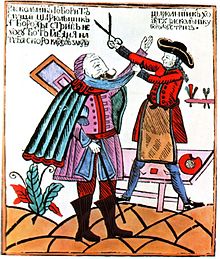Russian backwardness

Russian backwardness ( Russian Отсталость России , backwardness of Russia ) is a term that originated in the West and was supposedly widespread from there. He appeared in cultural, political, and economic relations between Russia and Western Europe during the past five centuries. The term is based on a (desirable, exemplary) norm of progressive Western Europe to be achieved, from which Russia deviates. Thus, this is called late, underdeveloped and backward. Backwardness was also used as an argument in debates and political disputes within Russia and the Soviet Union , both by Lenin and currently in the 20th and 21st centuries.
Origin and use of terms from a western perspective
The origins of a concept of backwardness can be found in Western Europe as early as the Middle Ages . In the 16th century, the term was still flexibly interchangeable with attributes such as barbaric , Nordic and Asian . The use indicates an arrogant attitude on the part of Western European travelers and intellectuals in connection with cultural misunderstandings (cf., among others, Siegmund von Herberstein ).
The concept of Russian backwardness was expanded during the Western European Enlightenment in the 18th century, where it forms the counterpart to the Western European concept of civilization and culture with the newly emerging concept of Eastern Europe .
In retrospect, the term “Russian backwardness” is used by some contemporary German-speaking historians such as Manfred Hildermeier (2013).
Concept of backwardness in the debate within Russia and the Soviet Union
Within Russia, the controversy with the backwardness allegation of Western Europe, especially under Peter I ( Petrinian reforms ) and Catherine II, led to many attempts at "Europeanization", which resulted from occupation with philosophical theories, historical writings, state models or utopias (including Kant , Hegel , Schelling ) found its beginnings.
In 1829 Pyotr Jakowlewitsch Tschaadajew represented the thesis of the backwardness of Russia in his "first philosophical letter", which was first published in 1836. The Russian Westerners , to whom Tschaadajew belonged, cited Russia's backwardness as an argument for modernizing Russia according to the Western pattern, while their opponents, the Slavophiles , emphasized an independent path.
In 1931, Stalin gave a speech at the first union conference of the functionaries of socialist industry in which he named the historical backwardness of the Soviet Union towards its enemies as a compelling reason for industrialization. He led the defeats of Russia a. a. in the Crimean War and the Russo-Japanese War , but not in the First World War . The accelerated catching up of the backwardness of the Soviet Union vis-à-vis the West in the areas of industry and the military (but not in the areas of enlightenment and democracy) formed a key argument for industrialization and deculakization .
In 2009, then Russian President Dmitry Medvedev resorted to the topos of backwardness by describing Russia as “backward and corrupt” in a comment for Gazeta . He referred to the economic structure (dependence on raw materials) as well as to the political culture (“low quality of public discussion”). The First Vice-Prime Minister of Russia Igor Ivanovich Shuvalov also used this topos in 2012. The RIA Novosti news agency quoted him as follows: "The backwardness and imperfection of the political system resulted in the state having an excessive influence on the economy, corruption and freedom of the press."
The Saint Petersburg sociologist Nikolai Wachtin sees a connection between "the public speechlessness of the Russians and the lack of free mass media " and emphasized: "If we had a different television (...), we would have a completely different statehood."
literature
- Mechthild Keller: Russians and Russia from a German perspective , Volumes 1–4. Wilhelm Fink Verlag , Munich 1987–2000
- Jack Snyder: Russian backwardness and the future of Europe . In: Daedalus . Vol. 123, No. 2 (Spring 1994), ISSN 0011-5266 , pp. 179-201.
- Bertram D. Wolfe: Backwardness and Industrialization in Russian History and Thought . In: Slavic Review . Vol. 26, No. 2 (June 1967), ISSN 0037-6779 , pp. 177-203.
Individual evidence
- ^ Manfred Hildermeier: History of Russia. From the Middle Ages to the October Revolution . Verlag CH Beck, Munich 2013; see: Review by Ulrich M. Schmid: A new history of Russia. Between triumph and catastrophe. NZZ online, June 12, 2013
- ↑ Medvedev calls Russia "backward and corrupt" Spiegel, September 10, 2009. (Original: Дмитрий Медведев: Россия, вперед!, Commentary by Dmitri Medvedev in Gazeta.ru)
- ↑ Russia's problems result from the backwardness of the RIA political system , January 27, 2012.
- ↑ Sociology: The Russians are a speechless people ( page no longer available , search in web archives ) Info: The link was automatically marked as defective. Please check the link according to the instructions and then remove this notice. , RBTH , October 14, 2014